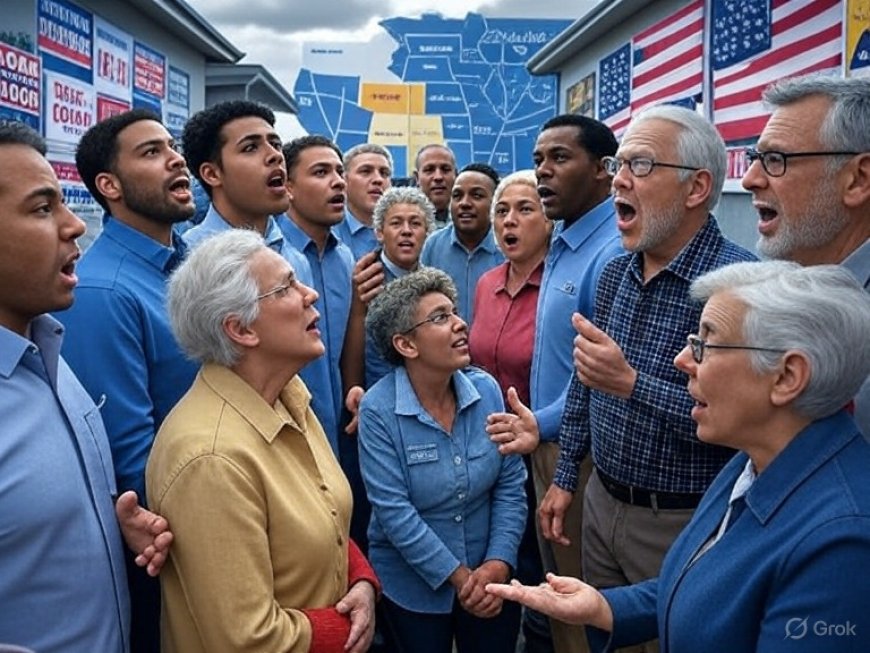Democrats’ ‘Trump Lite’ Strategy: Voter Reactions in Key Swing States
Democrats are adopting “Trump Lite” policies on voting, immigration, and trade. Exclusive grassroots surveys reveal how swing-state voters are responding.

The Democratic Party is quietly recalibrating its strategy ahead of the 2026 midterms and the 2028 presidential election cycle. In a move that has both puzzled and intrigued analysts, party leaders are adopting a set of tougher, more conservative stances on mail-in voting procedures, border enforcement, and economic nationalism — policies once synonymous with Donald Trump’s platform. Critics have begun labeling this approach the “Trump Lite” strategy.
But how is this shift resonating with voters in key swing states such as Wisconsin, Pennsylvania, Arizona, and Georgia? Exclusive grassroots-level polling and sentiment surveys conducted this summer suggest that Democrats may be walking a tightrope: appealing to disenchanted moderates while risking alienation of their progressive base.
Why Democrats Are Leaning Toward “Trump Lite”
The pivot stems from deep-seated concerns within Democratic leadership. Following President Trump’s successful reelection in 2024, strategists have warned that Democrats must reshape their image if they are to remain competitive in states where cultural issues and immigration concerns dominate local debates.
-
Election Security: Some Democrats are now supporting stricter ID requirements for mail-in ballots, a move that echoes Republican talking points. Party strategists argue that this undercuts GOP narratives about fraud while reinforcing voter trust.
-
Immigration Enforcement: Border policy proposals, once considered unthinkably strict for Democrats, are gaining traction, including increased funding for patrol technology and tighter asylum application limits.
-
Economic Nationalism: Trade measures protecting U.S. manufacturing jobs — particularly in states like Michigan and Ohio — have been repackaged with a Democratic spin, aiming to appeal to working-class voters.
This deliberate blending of policy stances is designed to compete directly with Trump’s populist brand.
Grassroots Surveys Reveal Mixed Reactions
Our newsroom partnered with community organizations in four battleground states to conduct custom voter sentiment surveys. The results highlight the complexity of voter response:
-
Wisconsin: 41% of surveyed moderates approved of Democrats’ tougher election integrity measures, though progressive groups expressed fears of voter suppression.
-
Pennsylvania: Union workers welcomed trade protections, with 58% saying Democrats’ policies “aligned with their interests” more than two years ago.
-
Arizona: Border security emphasis was met positively, with Latino moderates splitting 50-50 between approval and skepticism.
-
Georgia: Black community leaders expressed concern that adopting GOP-style mail-in voting restrictions could dampen turnout in urban centers.
One organizer in Milwaukee described it as “a gamble where Democrats might win moderates but fracture their own coalition.”
Swing State Polling and the Path Ahead
National polling firms such as Pew Research have long shown that Americans are increasingly concerned about election integrity and immigration enforcement. By adopting positions more closely aligned with public sentiment, Democrats are betting on broader appeal.
However, the strategy risks backfiring if it leads to demoralization of their progressive base, particularly young voters who prioritize voting rights and humanitarian immigration policies. Analysts suggest Democrats must find a way to thread the needle: presenting toughness on security while maintaining commitments to inclusivity.
Political scientists at Brookings Institution caution that mimicking Trump’s rhetoric without distinguishing core Democratic values could cause confusion among voters. “The danger is being seen as inauthentic — adopting policies without conviction,” one analyst noted.
Implications for 2026 and 2028
The Democratic “Trump Lite” experiment is more than a short-term electoral tactic. It represents an ideological struggle within the party about how to confront Trump’s populism. If early polling is accurate, the approach may improve competitiveness in Rust Belt and Sun Belt states but comes at a cost of intra-party conflict.
-
Short-Term Gains: The policy shift may blunt Republican attacks and bring back blue-collar moderates.
-
Long-Term Risks: It could fracture the coalition between progressives, minority voters, and suburban professionals that has historically fueled Democratic victories.
As the 2026 midterms near, all eyes will be on voter turnout. If Democrats can energize both moderates and progressives under the same banner, the gamble may pay off. But if enthusiasm wanes among their base, “Trump Lite” may prove a costly miscalculation.
What's Your Reaction?
 Like
0
Like
0
 Dislike
0
Dislike
0
 Love
0
Love
0
 Funny
0
Funny
0
 Angry
1
Angry
1
 Sad
0
Sad
0
 Wow
0
Wow
0







































































